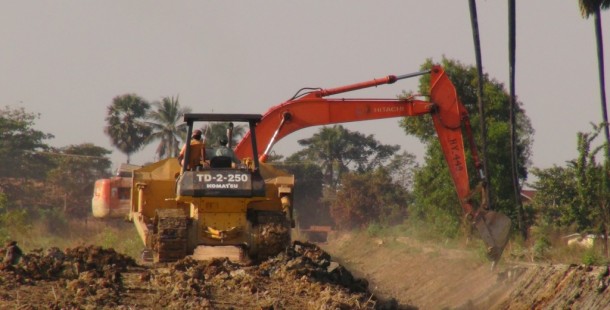MUDON TOWNSHIP, Mon State—Hundreds of farmers are asking the government for help after a dam project in Burma’s southern Mon State destroyed more than 5,000 acres of their rice paddies, an ethnic Mon lawmaker says.
Parliamentarian Nai Tun Ohn said the Winpanon Weir Dam project was initiated more than a decade ago under the former military junta, but farmers are coming to him now as debate in Parliament becomes more open under reformist President Thein Sein.
When the project began in 2000, Khin Nyunt, a former spy chief and prime minister under the military regime, attended the opening ceremony, saying farmers could continue growing crops during two seasons while also benefitting from the generated electrical power.
But the dam caused flooding that destroyed the rice paddies, said the lawmaker, whose village, Kawpehtaw, was among seven affected by the project in Mudon Township.
The ethnic Mon farmers, who have long suffered abuses under the former military junta, said they were afraid to ask the government for compensation, despite their losses, but would like help building an irrigation system to stop the flooding.
Under current conditions, many farmers have been forced to search for work abroad because they can no longer cultivate their rice paddies.
“It’s sad to see so many people leave their homes and go looking for employment in Thailand,” Nai Tun Ohn told The Irrawaddy.
The lawmaker said the issue was raised in Parliament last month, but the national government told the Mon State government to continue developing the dam project.
“I hope farmers can cultivate their rice paddies this year,” he said.
Before the dam project, each acre of land produced 50 baskets of rice during a single harvest, with some areas producing as much as 70 baskets. The land was valued at more than two million kyat (US $2,300) per acre, but today the barren fields, seen recently by The Irrawaddy, no long attract buyers.
The seven villages affected by the dam project include Kawlawthut, Kawpehtaw, Taung Pa, Tong Mong, Kwon Kapoe, Doe Mar and Kamarwet, according to Nai Tun Ohn.
Farmers said they were frustrated because authorities did not ask for their input when the project began, but they dared not complain to the former military regime, which was known for its brutal human rights abuses.
“The government was in control of the project,” said Mi Lon, a 60-year-old from Kawlawthut Village. “So who could we go to with our complaints? We were afraid of them [the military regime].”
Mi Lon, who inherited a rice paddy from her late parents, has five children, but after the dam project destroyed her land, four of her sons went to find work in Thailand.
“I have to rely on my sons to survive,” she said. “Without them, I don’t know how I’d even be able to eat, because of this dam project.”
Mi Nit, a 72-year-old farmer from Kawpehtaw Village, said the project destroyed 16 acres of her land.
“I’m really frustrated,” she said. “I can’t even go look at my land anymore; it makes me too upset.”
Her four children have also migrated to Thailand for employment.
“I thought I was going to die before, when I was no longer able to grow rice,” she added. “But now I can still eat because my children send me money.”
The Mon State government has continued developing the dam, said Mi Yee, another farmer from Kawpehtaw village.
“They destroyed one and a half acres of my land just last week,” she said. “I told them that I had to work hard to get this land, working in Thailand so I would have enough money to buy it.”
Mi Yee bought six acres of land after working in Thailand for seven years, she said, but the investment was for nothing because she can no longer grow rice.
As middle-aged farmers head to Thailand in search of money, their parents remain behind to watch children, despite their failing health and old age.
Mi Not, a 65-year-old grandmother in Kwon Kapoe Village, now takes care of her grandchildren while their parents are away.
Watching over three children is difficult, she said, adding that she felt weak from the physical requirements of being a caretaker. But she had no choice, she adds, because her family’s farmland was destroyed, and with it, their livelihoods.















